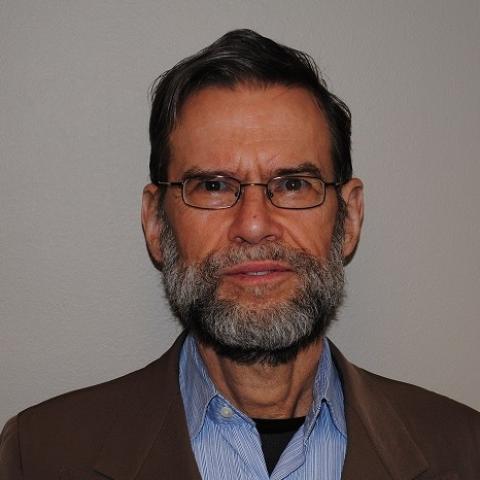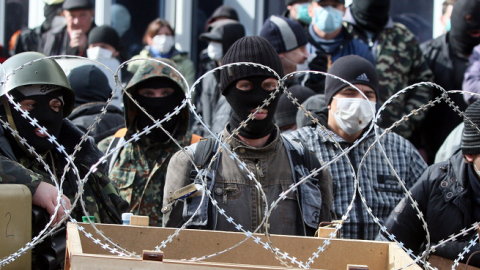Le Monde reported a few days ago that the eastern Ukrainian town of Slovyansk, "where no one stops in normal times," was the "epicenter of an historical drama that goes beyond it: the Ukrainian state finds itself between life and death." Vladimir Putin has been chewing off pieces of eastern Ukraine in professional special-forces operations.
What most news coverage isn't reporting is the failure of several major Ukrainian military efforts to retake the public centers seized by the Russians. As Piotr Smolar writes in Le Monde, the new Ukrainian government has revealed itself to be "without a real army, unable to lean on Western military support, incapable of insuring itself by the loyalty of the [security] services (SBU) or of the police."
This Ukrainian government—which has to assure the legitimacy of an election that will take place nationwide in little more than a month—is now under assault by foreign troops. It cannot survive without the forces that Max Weber defined as the very essence of the modern state.
What is happening now in these dreary provincial towns really is a matter of life or death for Ukraine. The country didn't exist as an independent state until 1991, and it may not survive as one into next year.
There was a heady sense of liberation this winter when the Maidan protesters in Kiev won, but the new government cannot survive the revelation that it is making empty threats against aggressors it can never fulfill. Beyond what the Russian attacks can gobble up in eastern Ukraine, Moscow can expose the new government as unable to cope with a crisis of national survival.
It is easy to deride Kiev's responses, but its new leaders are in the same situation as the Russian provisional government of 1917 after the fall of the czar. They are a disparate collection of politicians and activists, floated to the top of the govenrment by waves of still surging change, who must improvise the means of self-defense in a government rusted away by corruption, with an empty treasury, a foreign army penetrating deeper into the country, and friends from abroad who offer plenty of free advice but never act.
President Obama, David Ignatius wrote on April 17 in the Washington Post, "appears, for now, to have averted war. Each side can reasonably claim success." Is that so? The agreement reached on Thursday in Geneva does say occupied buildings and squares "must" be vacated, in return for an amnesty and all sides' promise to refrain from "violence, intimidation or provocative actions." In other words, Ukraine's attempt to assert its sovereignty on its own soil must stop.
And so Ukraine will come under the tutelage of the other powers that met in Geneva. Which ones specifically—the United States, the European Union, or Russia? The answer becomes clear not in the text of the Geneva agreement but in events on the ground.
Leaders of Mr. Putin's puppet "People's Republic of Donetsk" immediately announced that they had no intention of fulfilling the agreement. And why should they? They didn't participate in the negotiations. And who will persuade them? Only Russia possibly could, because Russia put them there, arms them, pays them and gives them instructions.
Under the Geneva agreement, we give Russia concessions in the hope that Moscow will be able to influence the puppet government it imposed. Geneva will in practice give Russia an international benediction for interfering in eastern Ukraine. Henceforth Russia has one more lever. The first, in use since the invasion of Crimea, is covert action with military special forces. The second will now be the international effort to negotiate a "solution."
It is a diplomatic masterpiece—for Mr. Putin. With the Geneva agreement, Russia has advanced considerably toward its goal of federalizing Ukraine and creating puppet domains carved into its eastern border, like South Ossetia and Abkhazia in Georgia. Russian Foreign Minister Sergei Lavrov made this clear in his revealing news conference.
The agreement specifies that "the announced constitutional process"—of drafting a new Ukrainian constitution—"will be inclusive, transparent and accountable. It will include the immediate establishment of a broad national dialogue, with outreach to all of Ukraine's regions and political constituencies, and allow for the consideration of public comments and proposed amendments."
Mr. Lavrov explains: "That is the essence of our agreement of today. . . . It is important that those who took over power in Kiev as a result of the coup . . . listen to [the regions'] worries, sit with them and begin negotiations on settling concrete problems of security in this or that settlement." So, for Russia, Geneva implies Ukrainian government recognition of the secessionist "governments" put "in power" by mobs of a couple of hundred people, in provinces of millions, and sometimes controlling only the buildings they sit in.
Russia wants the "federalization" of Ukraine. Federalization is newspeak for partition. Until Geneva, we kept this demand at bay. Russia hopes to reach it by what the U.S. has now agreed to. Russia's foreign ministry said of the Geneva agreement's disarmament provision that it includes "the militias of the right sector and other fascist groups, who participated in the February coup in Kiev."
The Geneva agreement will break down, probably soon, amid more Russian military moves and threats. Then, with our endless appetite for negotiation, we will go back to the table, no doubt to make more concessions.
So far all the American and European countermeasures, including Thursday's agreement, belong to a virtual reality native to politics: things you do to seem to be doing something, not to achieve any aim. They don't deflect Mr. Putin but further discredit the public space indispensable to a republican government.
The saving grace, if there is one, is that in the past week some in Europe are beginning to wake up to what is really happening. For the first time there is a note of real urgency in European journalism close to some governments. The question is finally being asked: What if an independent Ukraine does not survive?
With Ukraine's partition, occupation or dissolution into chaos, the order America helped to establish in the region after 1991 will also come tumbling down. And the crash will reverberate world-wide. If President Obama will not defend the arrangements achieved by three earlier presidents over 20 years, everything our efforts and sacrifices achieved since the end of the Cold War will be eroded as quickly as sand castles with the tide.




















